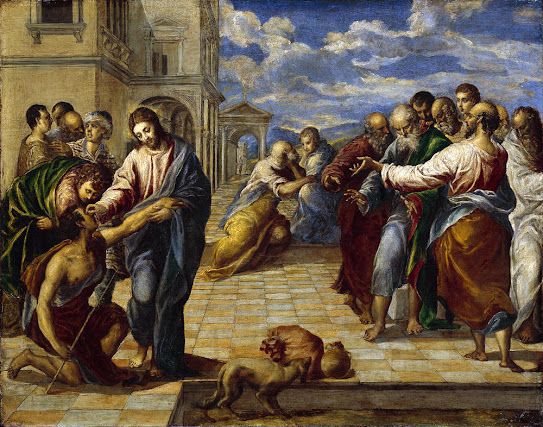I have shown you many good works from my Father.
For which of these are you trying to stone me?
They were agitated by the good works as well, especially when they were performed on the Sabbath. But this was because they forced them to contend with the question of what power was at work within him that could accomplish such works. They tried to attribute them to the devil, but as Jesus said, a house divided could not stand. They tried to insist that he was a sinner, but those whom he healed realized that God did not listen to ordinary sinners in the way that he listened to Jesus. The works themselves all pointed to the message that Jesus came to reveal: that he was the Lord of the Sabbath, the Lord with power over the wind and the waves, over sickness and disease, the Lord of life.
The Jews answered him,
"We are not stoning you for a good work but for blasphemy.
You, a man, are making yourself God."
If he had only made the claim to be God but done nothing to back it up then dismissing it might have been reasonable. But what was actually happening was what the disciples of John the Baptist were commanded to report: "the blind receive their sight and the lame walk, lepers are cleansed and the deaf hear, and the dead are raised up, and the poor have good news preached to them" (see Matthew 11:5). To insist on a charge of blasphemy in the face of these good works was to willfully ignore a great manifestation of God in their midst. They ignored him because to accept him would mean to accept his judgment on them, on their hypocrisy, on the whole world view that they believed in order to justify their ascendency and privilege.
We tend to believe about ourselves that we would not reject the works of Jesus in our midst if it were we who witnessed them. But what if he also at the same time upended our entire way of living up until that point, and demanded changes of behavior that we had heretofore given the most thoroughgoing of justifications? Would we willingly break ties with the lies we cherished or would we rather prefer to merely dismiss the works and condemn the one who worked them?
"Is it not written in your law, 'I said, 'You are gods"'?
Scripture was willing to call even deeply flawed people gods in some lesser sense, since their authority, and the fact that they were created in the image of God made them in some sense capable of symbolizing the Almighty. Therefore it was possible, and even not unreasonable, that God himself might reveal himself by taking to himself a human nature. If a normal flawed human could in some way communicate the reality of God then it must also be true that God himself could speak to us as one of us, man to man. He was not so utterly transcendent or disassociated from reality that this association could not exist. Reality, and especially the reality of the human person was designed from the beginning to be opened out unto the word of God communicating himself unto it.
If I do not perform my Father's works, do not believe me;
but if I perform them, even if you do not believe me,
believe the works, so that you may realize and understand
that the Father is in me and I am in the Father.
Jesus demonstrated his claim and offered argument in support of its plausibility. But the nuanced hypocrisy of his audience made it easy for them to get lost in their own counterarguments. The blunt fact of the miraculous and mighty deeds of Jesus was the hardest for them to ignore or explain away so Jesus appealed that they would at least consider that again, at least try to look at those works with sincere and honest hearts.
As Christians we do believe the works. But although we also profess faith that Jesus is the Son of God our lives do not always reflect this. There is still a tension within us between the old lies we cherished and the new life to which we are called. And because of this we need to look again to what Jesus has done and what he said about himself so that we too can come to a place of deeper conversion.
"John performed no sign,
but everything John said about this man was true."
And many there began to believe in him.
The crowds began to believe. But faith must grow beyond humble beginnings into something that can sustain the way of life of a true disciple, one who can follow Jesus even all the way to the cross and beyond. Foundations are tested we encounter suffering and darkness. We second guess arguments and disbelieve works which once seemed obvious. But in the midst of such darkness we are invited to an ever deeper faith, rooted less and less in ourselves and what we can prove, and more and more in what God himself reveals. It is this faith that can make us confident as Jeremiah was confident:
Sing to the LORD,
praise the LORD,
For he has rescued the life of the poor
from the power of the wicked!


_-_Fiery_furnace_01.jpg)









